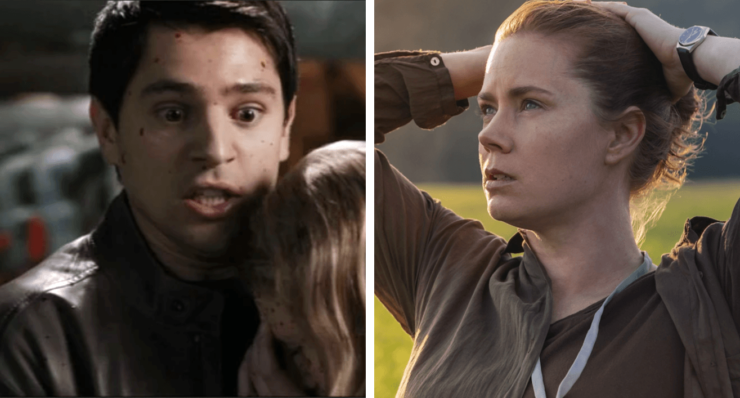Am I the only one who’s noticed this??? Themes, tone, even the depressive, steel-blue-tinged film stock: the (surprisingly great) fifth entry in the gruesome Final Destination franchise and Denis Villeneuve’s thoughtful multiple-Oscar-nominee, Arrival, are the same movie.
I mean, mostly.
Granted, I’m coming to Final Destination a bit late, but I was startled by the similarities between a twenty-year-old teen horror franchise and the Hugo Award-winning adaptation of Ted Chiang’s cerebral short story. Before I get into it, I’m going to spoil Arrival, “Story of Your Life”, and the entirety of Final Destination series.
<TonyToddVoice> YOU’VE BEEN WARNED.
If you’ve never seen a Final Destination movie: the original installment takes place in the year 2000. We join Alex Browning as he leaves for his high school French class’s trip to Paris. Everything about this feels insane now. A group of rowdy disheveled teens are allowed to board an airplane with barely any security checks, no shoe removal—they’re just allowed on the plane. The kids are the usual stereotypes: popular couple who can’t keep their hands off each other, violent tough guy being played by a 20-something, the main character’s main bro, who’s a weird burnout, and the outcast girl whom the main character eventually notices is hot. Our main character has a psychic vision of the plane blowing up, and his freakout culminates in getting the Alpha Couple, the homicidal teen, the burnout buddy, and Everyone’s Favorite Teacher thrown off the plane. Creepy Girl (who is named Clear Rivers, not Claire but fucking Clear) watches this, realizes something is afoot, and bolts after them.
The interesting thing is that it’s like one, maybe two security guards throwing them off the plane, and everyone thinks they’re going to be allowed back on the plane. They’re extremely incensed when this isn’t the case. And when the plane explodes a few minutes after take-off, all of them are allowed to leave? One of the guards does question Alex somewhat aggressively about how the boy knew something was wrong with the plane, but the film doesn’t suddenly shift to an interrogation scene in an offshore supermax prison.
Ah, 2000.
The lucky few who escaped the explosion begin dying in hilariously byzantine ways, and, naturally, they begin to believe that they’re cursed. This is confirmed by Tony Todd as William Bludworth, a coroner who explains that Death Itself is stalking them. They were all meant to die on Flight 180, you see, and now Death has to tie up the loose ends…. or the universe gets thrown out of whack or something. Unlike Ms. Rivers, the existential stakes are never clear. [Editor’s note: AHEM.] The other thing that isn’t clear is how the hell Mr. Bludworth knows any of this.
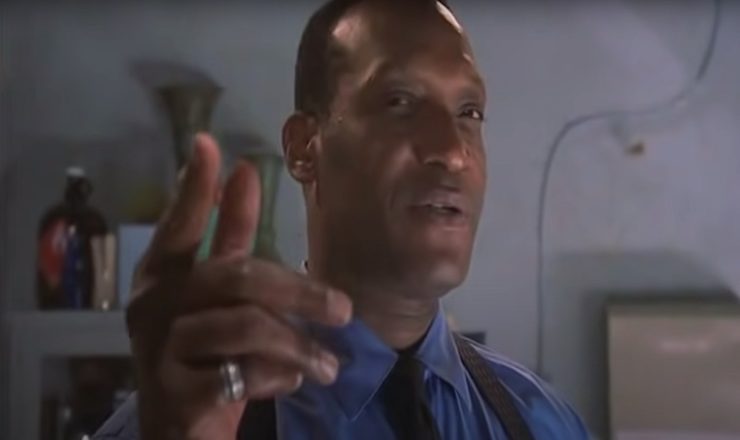
The first film was a hit, and four sequels followed: Final Destination 2, Final Destination 3, and The Final Destination all follow the same template. Groups of teens or college students—usually outfitted with some combo of Alpha Couple, Burnout, Violent Teen, etc.—plus sometimes an unlucky adult or two are saved by the main character’s prophetic vision of doom, only to realize that their survival was a delay, not a reprieve. My colleague Natalie Zutter pointed out that it seems like Death gets bored half-way through the series and has to keep topping Itself, and I think she’s right. Consider:
- The Logging Truck Incident, which, if my informal polls are to be believed, changed the driving habits of subsequent generations.
- Elevator Decapitation, in which it’s not enough that the elevator doors are squeezing a woman’s head like a grape, oh no—she has to get her hair tangled in the box of metal hooks a fellow passenger is holding
- Tanning Bed Barbecue, which comes after the Rollercoaster Catastrophe, where teens are broiled alive while “(My Love is Like) A Rollercoaster” blasts on the salon’s speakers.
- Chekov’s Nail Gun, in which a teenage hardware store employee almost watches her dumb boyfriend die like 12 different ways only to fall backwards into a nail gun, resulting in unexpected, unwanted, but highly realistic Pinhead cosplay
- Ultimate Gains, in which a football player’s head is crushed by his weightlifting machine, whilst he screams “FUCK DEATH!!!” but only after the inexplicable decorative wall swords slice through the machine’s cables at the exact right moment.
- Poolside Grand Guignol, in which a college student, um, look, he gets sucked onto a pool drain and his insides end up on the outside. It’s great.
Anyway, the point is that Death will always find you—and part of the fun, if you like this sort of thing, is reveling in all the ridiculous ‘00s fashion and music in between each theatrical demise. And it’s not just the deaths themselves—from FD2 on, Death tends to strike either when you’re doing something fun, when you’re doing some sort of teenage drudgery, or, at the very least, with some sort of twist of indignity. While the Logging Truck Incident affects a wide range of people, the person who has the prophetic vision is a girl embarking on her first spring break road trip. The Rollercoaster Collapse happens during Senior Night, the Tanning Bed Barbecue comes when a pair of surviving teen girls want to look extra nice for their dead classmates’ memorial, and Whoops-a-Daisie Pinhead happens while another teen survivor is working a late shift at her afterschool job. The college kids are only at NASCARtastrophe because one of them insisted on a study break, and The Final Destination’s best death, The Grand Guignol at the Pool, kills the main character’s caddish friend immediately after anonymous sex. Half of the film’s other deaths happen, or almost happen, during a mall shopping spree/movie date. And of course, the entire cycle is apparently kicked off by a trip to Paris, and The Final Destination ends with a (failed) attempt at going to Amsterdam.
But with Final Destination 5, things feel… different.
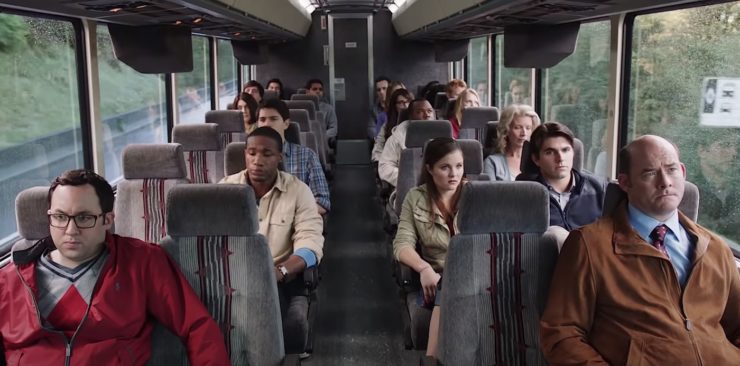
To start with, rather than high school or college students, the fifth film follows a group of whole-ass adults, and rather than a NASCAR race or a road trip, they’re going on a corporate retreat. (Well, mostly whole-ass adults—there are two younger interns, but more about them in a sec.) Main character Sam Lawton is facing a choice: he has a solid office job with his bro Peter, but he’s also moonlighting at a restaurant, and the head chef has just offered him a once-in-a-lifetime apprenticeship in Paris. Should he run off to Europe to pursue his culinary dreams, or settle into a more stable adulthood at home? Complicating this is his now-ex girlfriend—and coworker— Molly. If he stays, can they repair their relationship? Or can he talk her into coming with him? All of these concerns are derailed when he has the requisite nightmarish vision of death, in this case a horrifying bus accident/bridge collapse combo move. He manages to get himself, Molly, his bros Peter and Nathan, and interns Olivia and Candice off the bus. Their boss, Dennis furiously runs after them, and dorky coworker Isaac, sensing something is afoot, bumbles his way to safety.
The film follows the usual trajectory, except this time it feels oddly, I don’t know, muted? Distant? There’s a strange feeling of timelessness. There are only a few pop culture references, no glaring fashion choices. We hear Kansas’ 1978 hit “Dust in the Wind” a couple times (obviously) and we hear a late-‘90s Everclear song, but that’s about it. When Bludworth arrives in his coroners van he seems tentative, not at all the sardonic angel of death he is in the earlier installments, and for once he gives real, solid advice: if the group can find people to take their places in death, the scales will balance and they will be saved.
This leads to another shift in tone. Instead of operatic teenage drama, we’re watching the dorky coworker rifle through his dead office-mates desks looking for coupons, while a newly-promoted coworker grapples with the difficulties of being middle management. A couple nearing 30 argues about whether their relationship can last. Rather than tanning beds, post-sexy-times pool Grand Guignols, or even mall explosions, we get the dorky coworker dying in a fire after he sexually harasses an acupuncturist, and one of the interns finally drumming up enough courage for LASIK, only to have the operation go terribly awry. (If you have a thing about eyeballs this is not the Final Destination for you.) The only death that feels normal—in this context—is the second intern’s. Just quickly: it turns out that she’s a college student, which mean that not only is Peter dating one of his direct reports, he’s dating an undergrad. Come on, Peter. But any potential conversations about power dynamics are rendered moot by her spectacular gymnastics-based death—truly one of the best in the whole series.
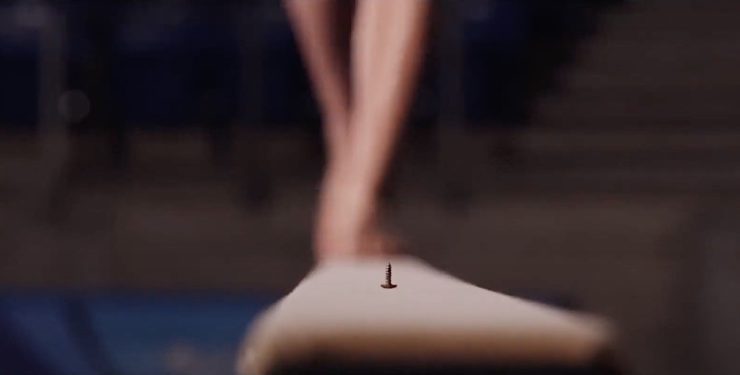
Around all of this loops the Big Decision: can these regular people check their moral compasses at the door and foist their deaths onto other people? Can Sam nudge a stranger into oncoming traffic? Can Nathan accept that the “accidental” death of one of his direct reports has given him a second chance at life? Can Peter actually use that gun he bought? Rather than the dark nihilistic fun of watching teens get picked off one by one, we’re now watching adults, with student loan debt and mortgages, grapple with the idea that they might be willing to kill.
Finally, we’re down to two characters, Sam and Molly, reconciled and heading off to Paris, trailing enough compensatory deaths that, at least by Mr. Bludworth’s math, their debts are settled. When the scene cut to the plane, I said, out loud, into the silence of my apartment: “Uh huh, it’s Flight 180, right? Hahahaha” and then watched with increasing glee as, across the cabin from Sam and Molly, Alex Browning threw his fit, the original group was thrown off the plane, and Clear Rivers bolted after them. And then, YES, the plane exploded, and we got to revisit the tragic events of Final Destination from inside the plane, as engines blew, fires broke out, people screamed and tumbled through the air, and the oh-so-thin metal walls of the plane itself peeled away and sent Molly and then Sam shrieking into the night sky.
And THEN we cut to Nathan at the wake for his direct report, Roy (this is when I started applauding—I couldn’t help it) and just as he learns that Roy had a terminal brain aneurysm that could go at any minute, a chunk of plane crashes through the ceiling and crushes him.
This was the reason for the odd mutedness! This was the reason for the absolute lack of pop culture references, or identifiable fashion choices! And this was why Sam wasn’t detained by the police longer after the bridge collapse, which any time after 2001 would have screamed “terrorist attack” to U.S. authorities! This movie, made in 2011, was looking back at a time that was already fodder for period pieces!
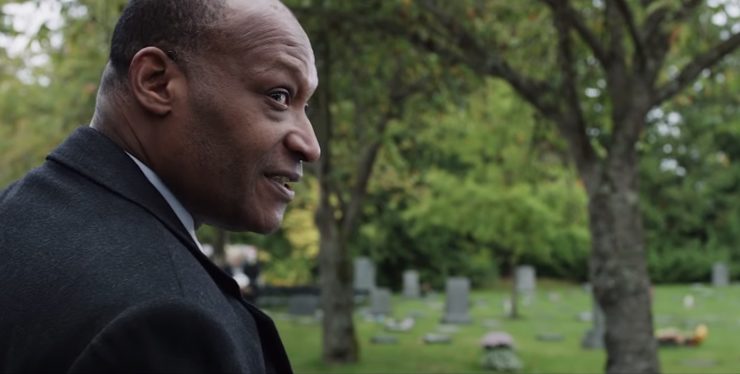
This was when I remembered that Final Destination 5 was written by Eric Heisserer—the screenwriter who would later adapt Ted Chiang’s “Story of Your Life”. Which was also when I realized that this is the *same story* as Arrival.
I mean, not exactly the same, obviously. Ted Chiang’s “Story of Your Life” is a delicate refraction of a story, a slow build of emotion that is also, at its heart, a thought experiment. Learning the language of the alien “heptapods” allows Louise Banks to see the events of her life simultaneously, rather than in the usual human chronological fashion. It’s the linear chronology that gives us free will. (Maybe.) What does her new relationship to time do to her choices? What does Borges have to say about all this? If she knows that her marriage will end in divorce, should she bother? If she knows that she’ll find new love later on in her life, does she have to do anything to welcome it, or will it fall into place whether she will or no? If she knows her daughter will die young, how does that knowledge animate all of her choices as a mother?
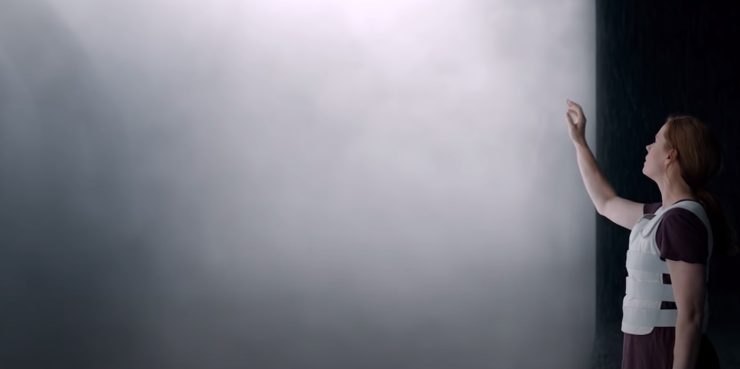
The answer, in Chiang’s story, is that following the path of the future seems to feel as “natural” to Louise as “making choices” did in the days before the Heptapods. Her first marriage ends for all the usual reasons marriages end, and Louise seems comically annoyed by her ex-husband’s new partner. Her own new partner seems like a nice enough man when he comes on the scene; her daughter accepts him, and seems happy for her mom. Once their daughter is grown and out of college, Louise and her ex don’t really speak—until Louise gets the news of their daughter’s death in a rock-climbing accident. The news she’s always known was coming, but told no one about. The past and future loop and turn back on each other until Louise lives in an eternal now, always wondering if she can change things, always feeling like what’s happening is correct. Chiang refracts time in sentences like: “I remember once when we’ll be driving to the mall to buy some new clothes for you” and “Your eyes will be blue like your dad’s, not mud brown like mine. Boys will stare into those eyes the way I did, and do, into your dad’s, surprised and enchanted, as I was and am, to find them in combination with black hair. You will have many suitors.”
Eric Heisserer takes this constant awareness of past and future and uses a similar approach in his adaptation to the one he took for Final Destination 5: logically we all know that there’s a clock ticking for us, but how to we respond when we can hear the clock?
Arrival matches FD5’s structure nearly exactly. The first five minutes of Arrival show us Louise’s daughter, Hannah, living her all-too-brief life, as Louise narrates. This is presented chronologically: we open with Louise and the baby, we end with her holding her 12-year-old daughter in the moments after her death.
It’s gutting.
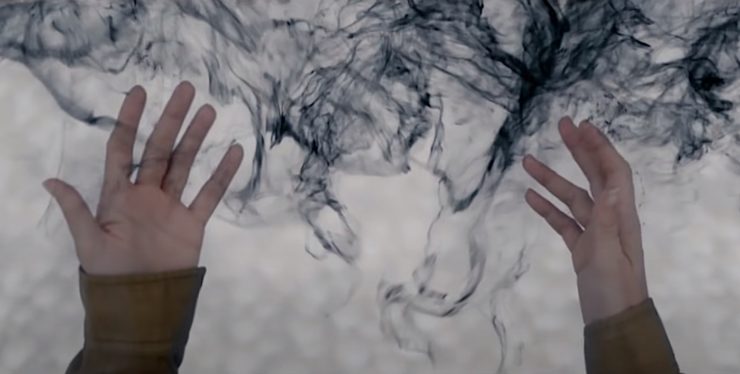
But then as the film continues, and we follow Louise to her job as a college professor, we assume that her innate stillness and the cool grey lighting of the filmstock are reflecting her sorrow; when she ignores the hordes of students huddling around a TV and watching first contact, we assume it’s due to her overwhelming grief. Once she’s on-site at the Heptapods’ ship she’s sometimes incapacitated by flashbacks to her daughter’s life.
Except these aren’t flashbacks at all.
These scenes are the result of her sense of linear time collapsing. As the Heptapods’ language rewrites her brain, She experiences the life her daughter will have in the future. She even experiences moments of her life with Ian, though it seems to take her longer to realize the identity of Hannah’s father.
As in FD5, we realize with a jolt that everything we’ve seen has been a prequel to the larger story—in this case the story of Hannah’s life.
In the film adaptation, Heisserer takes “The Story of Your Life” and teases out the two stories that Chiang was telling. One follows humans reacting to an alien encounter. Some ignore it, some turn to religion, some prepare for war, some plant bombs, some look at it as an opportunity for new connections and ideas. Unlike in the story, we see these responses play out in cinematic action sequences, with Louise’s new experience of time having a direct effect on world events.
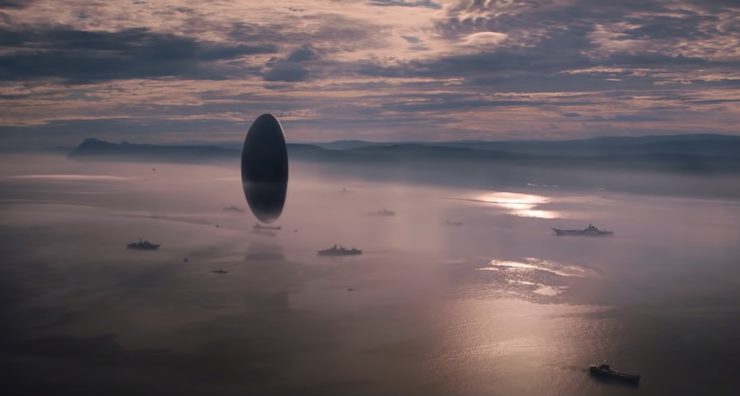
But Heisserer also makes significant changes to the more intimate story of Louise Banks. She doesn’t just make a choice about bending to the will of the future, knowing that her marriage will eventually break up and her daughter will die as a young girl—she does it knowing that her daughter will only get about a decade of life, some of that in the throes of a terminal illness. And she goes into motherhood knowing that the very choice to have their daughter is what will drive her partner away when she “tells him something he’s not ready to hear”—i.e. that she knows, and has always known, that their daughter is doomed—he will tell her that she “made the wrong choice”. Where the Louise of the story never tells anyone what learning the Heptapod language has done to her experience of time, in the film Louise does tell her partner—but only after their daughter is born, a time bomb ticking away.
As we all are.
Movie Louise downs some wine and agrees to “make a baby” with Ian, knowing that her grief and solitude are encoded in the very moment of her daughter’s conception, but denying him that knowledge.
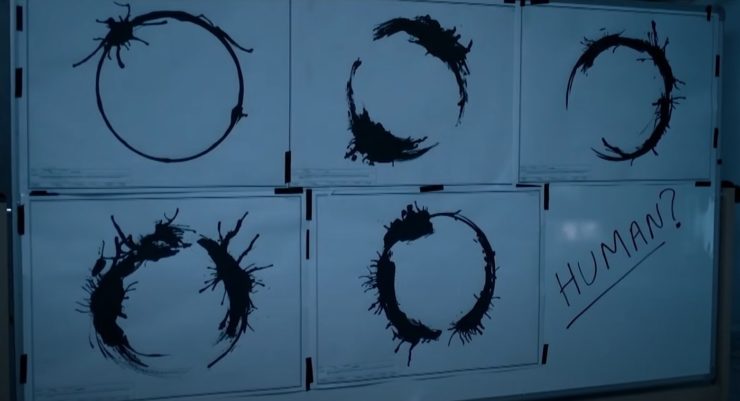
Writers tend to have their driving obsessions. They seem almost preloaded—themes and images we come back to time and again. David Mitchell has predation, Rian Johnson loves an impossible moral choice, Haruki Murakami can’t get away from cats and ears, Samuel Delany never met a weathered hand he didn’t like, or a class structure he didn’t want to poke at, and you can count on Shirley Jackson to excavate the performance of gender.
I’m not going to tell you mine.
It was shocking and delightful to me that Eric Heisserer took the gorgeously operatic premise of the Final Destination series and, asked to write a prequel, chose not to focus on the usual Rube Goldberg Death Variations (though those are great, too), but instead to talk about what the knowledge of the clock means for free will. Can you become a killer to save your own life? Can you walk into partnership and motherhood if you know how it will unfold? What will you do for a few more years? Was it the right choice to have a child? Was it a choice at all?
As I watched Final Destination 5 in 2022, and looked back to Heisserer getting nominated for a Best Adapted Screenplay Oscar in 2017, and then thought about him joining this time-tested horror franchise in 2011, with his adaptation of Ted Chiang’s story still in his future, it became obvious to me, in a time-crunching flash of Eternal Now, that all the drafts and box office numbers and award nominations could only ever have resulted in me making a choice to write this essay about Final Destination 5 and Arrival.










